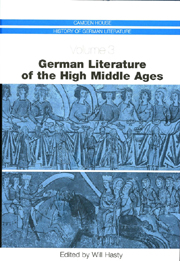Book contents
- Frontmatter
- Contents
- List of Illustrations
- Acknowledgments
- Introduction
- Part I The First Flourishing of German Literature
- Part II Lyric and Narrative Traditions
- Didactic Poetry
- Minnesang — The Medieval German Love Lyrics
- The German Heroic Narratives
- Early Mystical Writings
- Part III Continuity, Transformation, and Innovation in the Thirteenth Century
- Part IV Historical Perspectives
- Bibliography
- Notes on the Contributors
- Index
The German Heroic Narratives
from Part II - Lyric and Narrative Traditions
Published online by Cambridge University Press: 05 February 2013
- Frontmatter
- Contents
- List of Illustrations
- Acknowledgments
- Introduction
- Part I The First Flourishing of German Literature
- Part II Lyric and Narrative Traditions
- Didactic Poetry
- Minnesang — The Medieval German Love Lyrics
- The German Heroic Narratives
- Early Mystical Writings
- Part III Continuity, Transformation, and Innovation in the Thirteenth Century
- Part IV Historical Perspectives
- Bibliography
- Notes on the Contributors
- Index
Summary
THE USE OF THE TERM “HEROIC NARRATIVES” in the title of this essay is a departure from earlier established tradition, but is in line with current scholarly consensus in medieval studies. The more traditional designation “heroic epic” is now usually employed to designate the Nibelungenlied, which is the prototypical German heroic epic and the model for all subsequent heroic literature. One of the dominant characteristics of this work is its apparent nihilism. But later heroic works view the world differently, with none coming close to the pessimism of the Nibelungenlied. Consequently, scholars are now arguing for a more flexible approach to the concept of genre regarding the heroic epic. This essay will employ the term “heroic narrative” to refer to a diverse body of texts ranging from the Alexanderlied (ca. 1140–50), to the Nibelungenlied (ca. 1200), to Biterolf und Dietleip (ca. 1260). While court literature generally depicted the two recurring themes of courtly love (minne) and adventure (âventiure) within the framework of the courtly-chivalric value system, heroic narratives evoked a pre-courtly society in which loyalty and kingship were more important. In general, the heroic narratives dealt with figures or events derived from the historic past of the Germanic peoples. Each author reworked this old subject matter to fit his own agenda. Heroes typically demonstrated both physical and moral strength. One challenge of these authors was to transmit the hero's deeds in such a way that the audience would be able to recognize them as heroic.
- Type
- Chapter
- Information
- German Literature of the High Middle Ages , pp. 161 - 184Publisher: Boydell & BrewerPrint publication year: 2006



